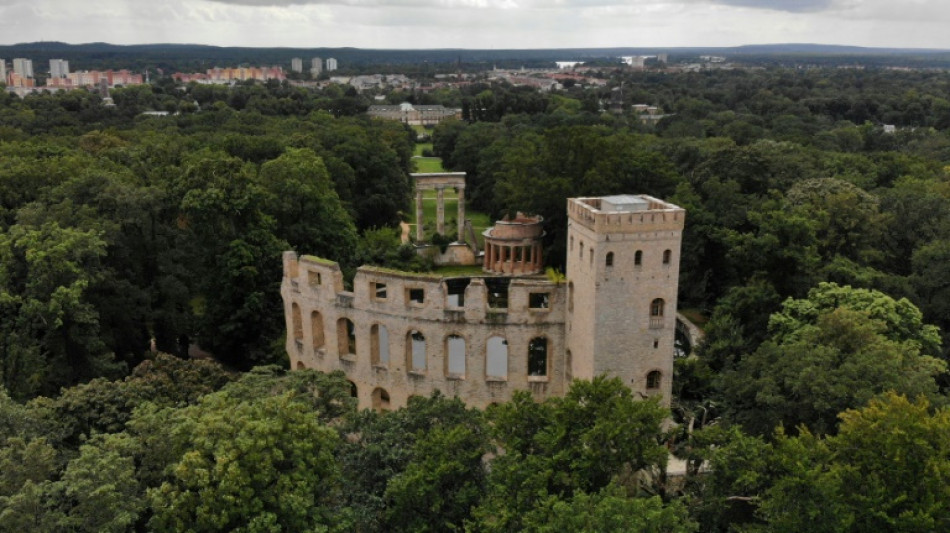
-
 Samsung plans $310 bn investment to power AI expansion
Samsung plans $310 bn investment to power AI expansion
-
Harmer stars as South Africa stun India in low-scoring Test

-
 Mitchell ton steers New Zealand to seven-run win in first Windies ODI
Mitchell ton steers New Zealand to seven-run win in first Windies ODI
-
Harmer stars as South Africa bowl out India for 93 to win Test

-
 China authorities approve arrest of ex-abbot of Shaolin Temple
China authorities approve arrest of ex-abbot of Shaolin Temple
-
Clashes erupt in Mexico City anti-crime protests, injuring 120

-
 India, without Gill, 10-2 at lunch chasing 124 to beat S.Africa
India, without Gill, 10-2 at lunch chasing 124 to beat S.Africa
-
Bavuma fifty makes India chase 124 in first Test

-
 Mitchell ton lifts New Zealand to 269-7 in first Windies ODI
Mitchell ton lifts New Zealand to 269-7 in first Windies ODI
-
Ex-abbot of China's Shaolin Temple arrested for embezzlement

-
 Doncic scores 41 to propel Lakers to NBA win over Bucks
Doncic scores 41 to propel Lakers to NBA win over Bucks
-
Colombia beats New Zealand 2-1 in friendly clash

-
 France's Aymoz wins Skate America men's gold as Tomono falters
France's Aymoz wins Skate America men's gold as Tomono falters
-
Gambling ads target Indonesian Meta users despite ban

-
 Joe Root: England great chases elusive century in Australia
Joe Root: England great chases elusive century in Australia
-
England's Archer in 'happy place', Wood 'full of energy' ahead of Ashes

-
 Luxury houses eye India, but barriers remain
Luxury houses eye India, but barriers remain
-
Budget coffee start-up leaves bitter taste in Berlin

-
 Reyna, Balogun on target for USA in 2-1 win over Paraguay
Reyna, Balogun on target for USA in 2-1 win over Paraguay
-
Japa's Miura and Kihara capture Skate America pairs gold

-
 Who can qualify for 2026 World Cup in final round of European qualifiers
Who can qualify for 2026 World Cup in final round of European qualifiers
-
UK to cut protections for refugees under asylum 'overhaul'

-
 England's Tuchel plays down records before final World Cup qualifier
England's Tuchel plays down records before final World Cup qualifier
-
Depoortere double helps France hold off spirited Fiji

-
 Scotland face World Cup shootout against Denmark after Greece defeat
Scotland face World Cup shootout against Denmark after Greece defeat
-
Hansen hat-trick inspires Irish to record win over Australia

-
 Alcaraz secures ATP Finals showdown with 'favourite' Sinner
Alcaraz secures ATP Finals showdown with 'favourite' Sinner
-
UK to cut protections for refugees under asylum 'overhaul': govt

-
 Spain, Switzerland on World Cup brink as Belgium also made to wait
Spain, Switzerland on World Cup brink as Belgium also made to wait
-
Sweden's Grant leads by one at LPGA Annika tournament

-
 Scotland cling to hopes of automatic World Cup qualification despite Greece defeat
Scotland cling to hopes of automatic World Cup qualification despite Greece defeat
-
Alcaraz secures ATP Finals showdown with great rival Sinner

-
 England captain Itoje savours 'special' New Zealand win
England captain Itoje savours 'special' New Zealand win
-
Wales's Evans denies Japan historic win with last-gasp penalty

-
 Zelensky renews calls for more air defence after deadly strike on Kyiv
Zelensky renews calls for more air defence after deadly strike on Kyiv
-
NBA's struggling Pelicans sack coach Willie Green

-
 Petain tribute comments raise 'revisionist' storm in France
Petain tribute comments raise 'revisionist' storm in France
-
Spain on World Cup brink as Belgium also made to wait

-
 Spain virtually seal World Cup qualification in Georgia romp
Spain virtually seal World Cup qualification in Georgia romp
-
M23, DR Congo sign new peace roadmap in Doha

-
 Estevao, Casemiro on target for Brazil in Senegal win
Estevao, Casemiro on target for Brazil in Senegal win
-
Ford steers England to rare win over New Zealand

-
 Massive march in Brazil marks first big UN climate protest in years
Massive march in Brazil marks first big UN climate protest in years
-
Spain rescues hundreds of exotic animals from unlicensed shelter

-
 Huge fire sparked by explosions near Argentine capital 'contained'
Huge fire sparked by explosions near Argentine capital 'contained'
-
South Africa defy early red card to beat battling Italy

-
 Sinner beats De Minaur to reach ATP Finals title match
Sinner beats De Minaur to reach ATP Finals title match
-
Zelensky vows overhaul of Ukraine's scandal-hit energy firms

-
 South Africa defy early red card to beat Italy
South Africa defy early red card to beat Italy
-
Alex Marquez claims Valencia MotoGP sprint victory


German drought prompts rethink for ancient palace park trees
Climate change is taking a heavy toll on the ancient trees of Sanssouci, the sumptuous summer palace built in the 18th century as the Prussian answer to Versailles.
The sprawling grounds with their manicured gardens in Potsdam southwest of Berlin are surrounded by a park filled with soaring, centuries-old giants that are now feeling the bite of persistent droughts.
Forest manager Sven Hannemann, standing at the foot of an oak with a six-metre (20-foot) trunk circumference, gazed up at its canopy which once stretched over 500 square metres.
Now its sickly branches are only dotted with green. Hannemann gave the old giant another two years, "then it will be dead".
In its 600 years, the tree had withstood storms, frigid temperatures and two world wars, but the lack of rain in the last few years due to the climate crisis has sounded its death knell.
"In 2018 when it was very dry, it suffered a real shock like many woody plants here in the park," Hannemann told AFP.
"And since then it's actually been shrinking."
Sanssouci Park stretching across 300 hectares (around 740 acres) has been part of Potsdam's UNESCO World Heritage collection of stately homes and gardens since 1990.
Its palace draws more than 300,000 visitors each year.
The park, which counts some 26,000 trees, is now losing between 180 and 300 per year -- at least three times the number that died annually before severe weather in 2017-18, a spokesman for the Palaces and Parks of Potsdam and Berlin foundation said.
Although 2023 has been less dry than previous years, rainfall has proved insufficient to counteract past drought damage and around half of the trees are showing signs of distress, he said.
Beyond the lack of moisture, voracious insects have been feasting on the trees.
- 'Takes decades' -
Hannemann knelt at the foot of the dying oak and let sawdust trickle through his hand -- the work of capricorn and oak splendour beetles.
The insects have nibbled a veritable deluge of debris out of the growth layer between the sapwood and the bark, as evidenced by thumb-thick holes in the trunk.
"They eat the cambium and no tree can live without cambium," referring to the cell layer under the bark that is responsible for secondary growth, Hannemann said.
The dying giant trees leave gaping holes in the forest, which harm other trees because their trunks and the forest floor are exposed to the sun's radiation without protection.
Hannemann plucked a leaf from a beech shoot and demonstrated the protective reflex of deciduous trees.
"Then the beech leaf curls up -- so far, so smart," he said.
"What's not so smart about it is that the sun gets through to the thick inner branches which weren't used to it in the first place, and then the branches get a sunburn."
It's a vicious circle that Hannemann said impacts all tree species.
Dead oaks or beech trees can then at best only serve as habitats for bats, insects or mushrooms.
But if the trunks and branches are too rotten and pose a safety risk to park visitors, they must be felled.
Yet there is still hope for the gnarled inhabitants of historic parks such as Sanssouci, whose Rococo palace Prussian King Frederick the Great designed and built as a retreat during his reign from 1740 until 1786.
Gardeners at the historic sites are experimenting with heat-resistant tree species from the Mediterranean region with some promising results, Hannemann said.
His team in Potsdam is also relying on the power of evolution.
"We believe that native woody plants also adapt to some extent," he said.
For example, acorns from trees that are obviously less affected by drought get planted in the forest floor.
However, the newer, more robust trees will need time to grow the thick protective canopies needed for the ecosystem.
"That takes decades," Hannemann said.
S.AbuJamous--SF-PST



